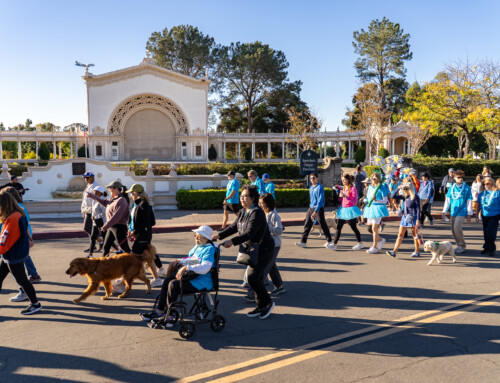
Scientists are still trying to determine the underlying causes of Alzheimer’s disease. However, they have identified a few genes that play an important role. Some of these genes are risk factors for the disease. Others are hereditary and will cause Alzheimer’s to develop with nearly 100% certainty. Genetics influence the two types of Alzheimer’s – Younger Onset and Late Onset – in different ways.
Younger Onset Alzheimer’s Disease
Younger Onset Alzheimer’s disease, occurring in people under age 65, is rare and represents less than 5% of all people with Alzheimer’s. For many with the disease, the cause is unknown. However, a small number have what is called autosomal dominant Alzheimer’s disease (ADAD) or familial Alzheimer’s disease (FAD). This is very rare and affects less than 1% of all people with Alzheimer’s. It is caused by a hereditary genetic mutation to one of three genes – PSEN1, PSEN2, or APP.
If a child’s birth mother or father carries a genetic mutation on one of these three genes, the child has a 50% chance of inheriting that mutation. If the gene is inherited, the individual will (with nearly 100% certainty) develop Alzheimer’s disease. This usually happens before the age of 60 and sometimes as early as their 30s. The genetic mutation is passed down from generation to generation, with about 50% of family members developing the disease.
Late Onset Alzheimer’s Disease
Late Onset Alzheimer’s disease, occurring in people age 65 and over, is much more common. Unlike the Younger Onset type, there is no genetic mutation that will cause Late Onset Alzheimer’s. Instead, certain genes contribute to increased risk of the disease. APOE is the best known genetic risk factor, though a few other genes have also been found to increase risk. There may also be genes that protect against the disease. For example, a very rare genetic mutation on the APP gene is associated with people living longer without developing Alzheimer’s disease.
The APOE gene
APOE comes in 3 forms, or alleles: e2, e3, and e4. Each person inherits one APOE allele from their birth mother and one from their birth father. As a result, there are 6 possible APOE combinations, all of which influence the likelihood of a person developing Alzheimer’s to a different degree. For example:
- Having one e4 allele is associated with higher risk of developing Alzheimer’s. It also increases the chance of onset happening at an earlier age. About 25% of people have one e4 allele. Two e4 alleles, carried by 2 to 3% of the population, represent an even higher risk.
- E3 is the most common form and is believed to have no effect on risk of Alzheimer’s.
- The e2 type is rare and is thought to potentially lower one’s risk of Alzheimer’s. Also, if a person does get the disease, it is more likely to occur in later life.
Non-genetic risk factors
There are other factors that can increase or decrease a person’s risk of developing Alzheimer’s disease regardless of their genetics. For example, age is the biggest non-genetic risk factor for developing Alzheimer’s. Therefore, everyone is at risk for developing the disease as they get older. Other factors that increase a person’s risk include fewer years of education, being female, and having cardiovascular disease.
Understanding the Odds
It is important to remember that Alzheimer’s disease is complex, with many contributing factors that are not well understood. If a person has a known risk factor, such as a relative with Alzheimer’s disease, it is not guaranteed that person will develop Alzheimer’s. Likewise, if a person has multiple factors that decrease their risk, including the absence of a high risk APOE allele, they can still get Alzheimer’s. Though Younger Onset FAD has been found to have a clear genetic link, this type is very rare. We cannot control our genetics, but we can control our choices about how to live our lives. Maintaining a healthy lifestyle can help in reducing the risk of developing Alzheimer’s disease.
Many important studies are underway around San Diego County to develop new treatments and address genetic risk factors for both Younger Onset and Late Onset Alzheimer’s disease. Find out more about local research and ongoing clinical trials.
Call us at 858.492.4400 to speak with one of our Dementia Care Coaches who are here to help San Diego County residents and/or those caring for someone living in San Diego County (Spanish speakers available). Also check out our free education classes, social activities, caregiver support groups, & more.
Updated on October 23rd, 2025
Adapted from NIH Alzheimer’s Disease Education and Referral Center and Banner Alzheimer’s Institute, 7/2020






